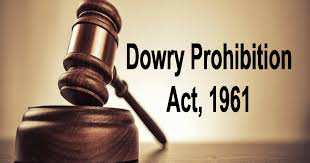Indian Legal System > Civil Laws > Family Laws > The Dowry Prohibition Act, 1961 > Cognizance of Dowry Offence
Section 7 of the Dowry Prohibition Act, 1961 gives provision for the cognizance dowry offence
Section 7: the Dowry Prohibition Act, 1961:
Cognizance of Offences:
(1) Notwithstanding anything contained in the Code of Criminal Procedure, 1973 (2 of 1974),—
(a) no Court inferior to that of a Metropolitan Magistrate or a Judicial Magistrate of the first class shall try any offence under this Act;
(b) no court shall take cognizance of an offence under this Act except upon—
(i) its own knowledge or a police report of the facts which constitute such offence, or
(ii) a complaint by the person aggrieved by the offence or a parent or other relative of such person, or by any recognised welfare institution or organisation;
(c) it shall be lawful for a Metropolitan Magistrate or a Judicial Magistrate of the first class to pass any sentence authorised by this Act on any person convicted of an offence under this Act.
Explanation:
For the purposes of this sub-section, “recognised welfare institution or organisation” means a social welfare institution or organisation recognised in this behalf by the Central or State Government.
(2) Nothing in Chapter XXXVI of the Code of Criminal Procedure, 1973 (2 of 1974), shall apply to any offence punishable under this Act.
(3) Notwithstanding anything contained in any law for the time being in force a statement made by the person aggrieved by the offence shall not subject such person to a prosecution under this Act.
Only a court of Metropolitan Magistrate or a judicial magistrate of the first class can try the dowry offences under the Act which can be initiated upon own knowledge of the court or on a police report or on the complaint can be lodged by any social welfare institution also.
In Peyare mahto V. State of Bihar 1979 BLJ 42 of 45: 1979 BLJR 73 case, the Court Opined that cognizance of an offence is the first step towards trial. And cognizance means knowledge or notice of an offence. And the judicial officer will have to take cognizance before he could proceed to conduct a trial. Cognizance of offence not to be taken until enquiry report is submitted and such a situation arises when magistrate doubt on the complaint which is lodged.
In Jhapsi Choudhary Vs. State of Bihar 1983 BB CJ 110 Pat. 1983 Pat LJR358 case, the Court held that police is competent to investigate the offence unless he is expressly excluded to do so and in case of non-cognizable offence police are required to take the permission of the magistrate u/s 155 (2) of the court. Any investigation is nothing but a collection of material. And any irregularity in collecting material is fatal to the case.
In A.S. Sanyal V. Khen Chand 1983 2 crimes 384/385/386 case, the Court opined that Sec 2 (d) of Cr.PC defines complaint as any allegation made orally or in writing to a magistrate, with a view to his taking action under this code, that some person, whether known or unknown has committed an offence, but does not include a police report. In the absence of sufficient ground, the complaint can be dismissed.
In Raj Kishor Mahapatra and Others v. State of Orissa and another 1996 Cri LJ 684 case, the Court held that the magistrate has the power to arrange persons not named in the charge sheet as accused and issue process at any stage after taking cognizance of offence on consideration of available material.
In Jatindra Pal Singh V. State 1989 1 Hindu LR 84 at 85 Delhi case, an application was moved by the wife who in fact, was the real aggrieved party before the metropolitan magistrate, for withdrawal of the complaint but the metropolitan magistrate declined to accede to the request on the ground that the prayer was not maintained in view of the provisions of law and since the complaint has been filed on a police report it can only be withdrawn by the Public prosecutor. The Court opined that normally in such circumstances, the state should have taken prompt action in withdrawing the case as otherwise, it would adversely, affect the matrimonial life of the parties.
Provision of sec 6 and 7 (b) Held Anomalous:
In Tara Singh V. Balbir Singh (1985) Hindu LR 114 at 115 (Punjab) case, the Court held that the provision of sec 6 and 7 (b) of the Act are manifestly anomalous. Sec 6 lays down that where any dowry is received by any person other than the bride, then the person has to transfer the same to the bride within three months of the marriage and if he fails to do so within the prescribed period he shall be punishable for violation of the section. In other words the offence is committed only after expiry of three months from marriage if the person receiving the dowry fails to transfer the same to the bride within the period sec 7 (b) provides that no court shall take cognizance of any such offence except a complaint made by the bride or her parents or brother or a gazetted officer specially authorized by the state government on the behalf, within a period of three months from the date of marriage. It is not understandable as to how a complaint under sec 6 can be made within a period of one year from the date of marriage if the commission of the offence matures one year after the marriage.
Previous Topic: Return of Dowry (S. 6)
Next Topic: Dowry Prohibition Officers (S. 8, 9, 1nd 10)
